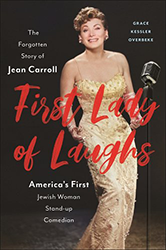Sarah Bernhardt is a name supercharged with show business energy. She was a woman who filled stages around the world with enchanting presentations of life, death, joy, and misery. From early childhood to old age, life for Bernhardt was not easy, simple, or boring. Opportunities, the help of friends, and a raw natural talent combined to make this woman into a theater superstar whose life off stage was no less dramatic than the emotions presented to the audiences who packed her performances.
Sarah Bernhardt’s name, in her time and beyond, has become synonymous with acting achievement. Bernhardt had an unusual childhood — born to an unwed sixteen-year-old seamstress, her mother then became a high class sex worker whose customers were powerful, wealthy men, sometimes with royal connections or titles. While her mother’s job was risqué, she and women like her were valued for their beauty and charm in sophisticated French circles. This life left little time for the young child who, longing for her mother, was left in the care of hired help. Bernhardt was sent to boarding school and from there to a convent school. Each school offered educational opportunities and places for Bernhardt’s increasingly eccentric personality to develop, but her beautiful, distant mother did little to assure the child of her love.
Resisting her mother’s efforts to force her into marriage at age sixteen to a person with a good trade, Bernhardt followed her own star. Her life direction changed dramatically when an influential friend of her mother sized her up as being destined for life in the theater. The path was not easy or obvious but with luck, ambition, and occasional help from influential people, Bernhardt developed an acting style that came to define theater. Attractive and tiny, with riveting blue eyes, her unconventional portrayals of heroes and villains lifted her to unheralded heights. She did things her way— disagreeing with theater directors, other actors, and wealthy patrons. She found a motto for life in an everyday French expression, quand même, which means “all the same” or “even so.” No matter the challenges that life presented, she kept going; whether she faced good luck or misfortune: quand même. Beyond her incredible dramatic flair, she grew to become a brave and caring person of heroic dimensions.
Antisemitism was pervasive in France during Bernhardt’s lifetime. Although Bernhardt was Jewish by birth, her connection to the religion was tangential. She converted to Catholicism and, at one point, considered becoming a nun. But when the antisemitc-tinged Dreyfus trial began, she stood proudly with those who defended the accused captain and declared, “I am a daughter of the great Jewish race…” Although she never practiced traditional Judaism, she felt closely linked to the Jewish people.
This fascinating story is beautifully told in elegant prose and includes myriad details which, in addition to describing the life of Sarah Bernhardt, offers an insider’s view of the history of the era. Period photos, an index, a timeline, a bibliography, and notes are included.
Award-winning journalist and freelance writer, Helen Weiss Pincus, has taught memoir writing and creative writing throughout the NY Metro area to senior citizens and high school students. Her work has been published in The New York Times, The Record, The Jewish Standard, and other publications. She recently added “Bubby” to her job description.





